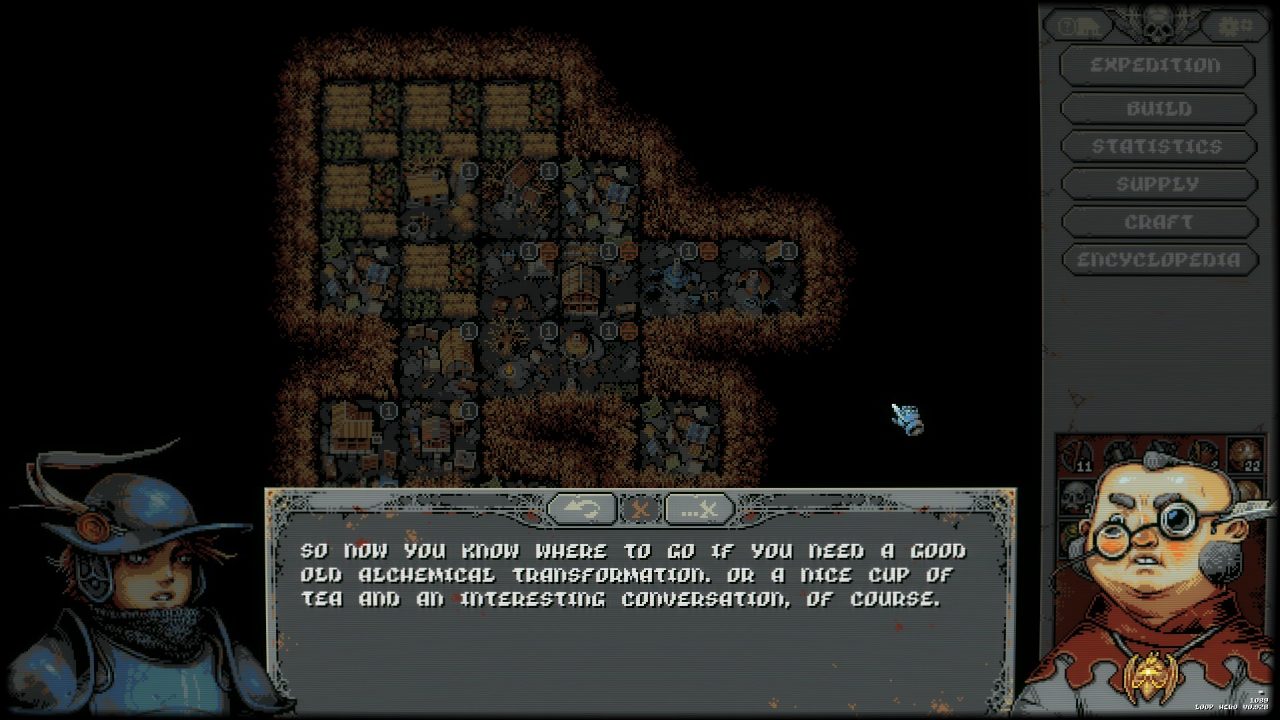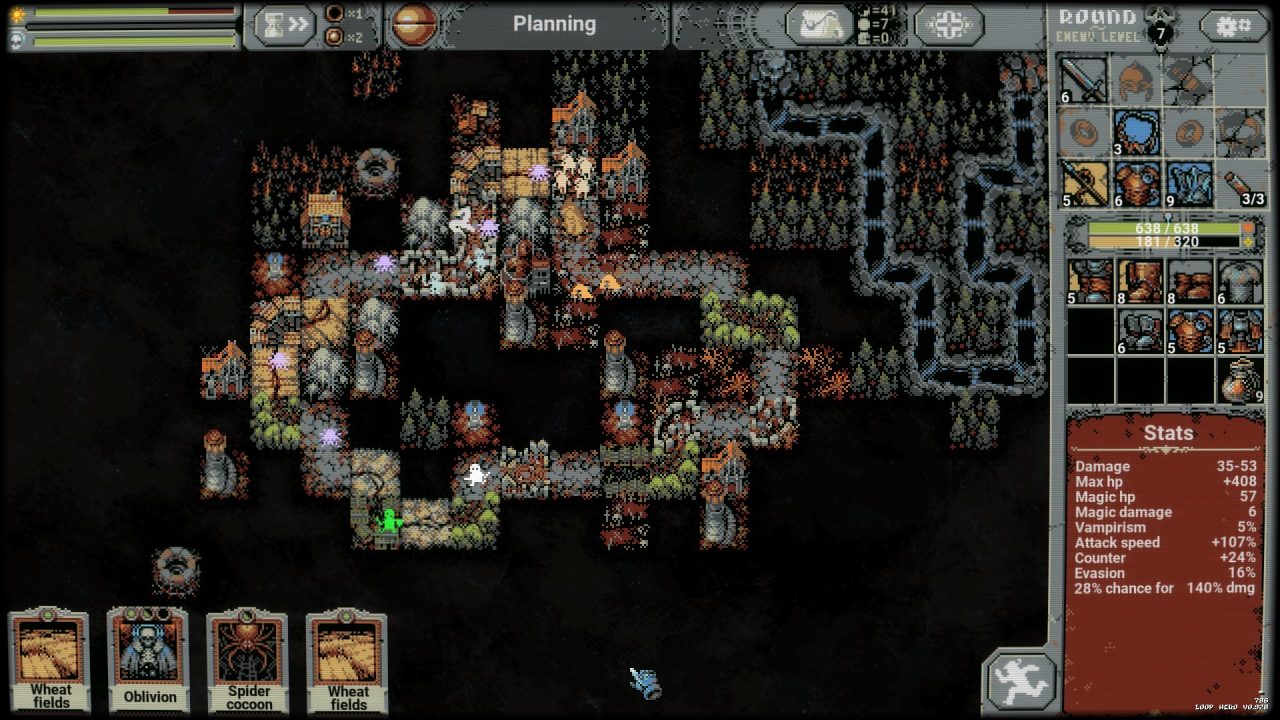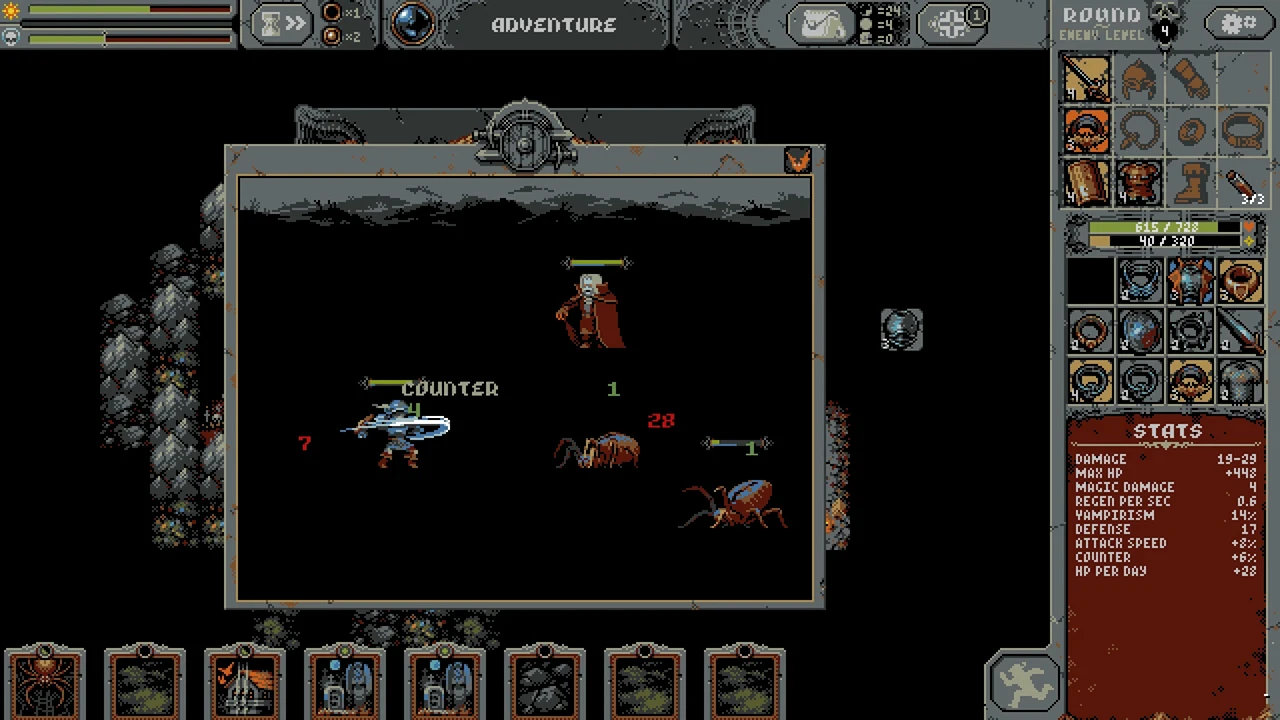There’s something very calming about routine. Whether it’s doing the same things or walking the same, familiar paths, all without thinking, it can help give your day a structure or purpose and sometimes help you focus and stop thinking about negative things. When Loop Hero launched on PC back in March, I was struggling and couldn’t settle into a routine, so I’d pop on playthroughs of this cyclical auto-battler in the background. I was mesmerised, watching this little pixelated character walk around a looping path and seeing how meticulous the player was in making their decisions.
As silly as it sounds, watching someone else settle into a routine to play a game that’s about walking along the same path over and over helped get me back into a routine. Playing the Switch port of Loop Hero nine months later, that same rhythmic quality is there; now I’m the one placing the cards down as this small figure loops around and around this dreary and depressing world.
There’s not a lot of visual variety to Loop Hero, but what is there is both sparse and intensely detailed. Character portraits show pixelated shading under the eyes and the pale faces of the survivors as they try to live and make do. Enemy sprites are vivid and animated, particularly bosses, who often radiate from the screen for their distinctive appearance. And the way the multiple card tiles knit together and create these densely populated maps is wonderful. The dreary colour palette won’t be to everyone’s taste, but it helps immerse you in the game’s atmosphere.
Throughout Loop Hero, you send your character on expeditions and gather materials for camp and to find out what’s happened to the world, which has been drowned in darkness. The people the hero encounters don’t remember anything, nor does the hero, so much so that every single expedition, the path is different. The only sure thing is that the pathway is cobbled stones, it always goes in a “loop,” and you can decide how long to stay and how many risks to take on each journey. The story isn’t the focus here, and while it’s decidedly sombre, there’s some light, surreal humour thrown in, but it just serves to emphasise the game’s core loop.

Loop Hero takes its inspiration from roguelikes, RPGs, card games, strategy games, and more to create something entirely of its own breed, but its most unusual mechanic is that it wrests control almost entirely away from you. The only thing you can do is stop and start their movement at the press of a button and “build” the world around them by laying down cards representing different fixtures. These can be rocks, beacons of light, vampire mansions, and even wheat fields. At the end of each loop, enemies get stronger, and your map will likely get more hectic with each round trip as you place more cards down. Place enough cards down, and the boss of the loop appears, ready to do battle.
If this sounds very simple, I don’t blame you, but Loop Hero is deceptive. So much has to be taken into consideration with every expedition; in every loop, you gather materials that you take back to camp, and what materials you pick up depends on how many loops you do, what cards you place down, and what enemies you fight. And you have to run loops over and over to get everything you need. The materials you bring back let you build new facilities that unlock new skills for your hero and new cards, which are vital to progressing through each of the four chapters.
The game is weirdly therapeutic and also a little bit stressful at times, but Loop Hero‘s music helps keep you on track. For such a small soundtrack, there’s a huge amount of variety. You go from ambient retro-sounding bleeps to more focused, rhythmic music with short cycles to blood-pumping boss themes, sometimes within minutes of each other. The ambiance creates a tension that just puts you a little bit on edge at first, but as you get used to the music, it gets intertwined with your gameplay routine. And more people should be talking about “Star Judgement” and just how hard it makes me want to dance.
This feels like the kind of game that thrives on a PC with a mouse and keyboard, yet Loop Hero‘s Switch port is surprisingly solid. You can use the touch screen when in handheld mode to select menus, and you use the shoulder buttons to access your deck and equipment. Unfortunately, placing cards on the map can get clunky, and if you accidentally release the shoulder button, when you go back into your hand of cards, you have to start from the far left again. It’s definitely a system that works better as drag-and-drop, but I managed to adapt after a few runs because it’s easy to slip into a rhythm when you start playing.
No card in Loop Hero comes with only benefits or only consequences. For example, forest cards increase your hero’s attack speed by 1%, but placing ten of these down creates a strange village filled with wooden men who will attack you. Storm Temples summon a lightning bolt every five seconds to attack two random targets on each tile in its path, but that random target can also be you. And villages heal you and give you quests, but the quest requires you to defeat a tougher monster that can sometimes end your loop prematurely.

The other thing to consider is that nothing exists within a vacuum in Loop Hero. Cards placed next to each other influence one another in drastically different ways. Placing a spider cocoon next to a grove means both ratwolves and spiders will spawn on the same tile. Then there are cards that, when set adjacently, can change their properties. Setting rivers next to sand dunes creates an oasis in place of the river, which goes from doubling the effect of concurrent tiles to reducing the attack speed of everything on the map. Sometimes, even removing cards with an oblivion card can change the situation. It’s so fun to keep experimenting and see what cards affect what and how they can work to your advantage—or disadvantage.
I unlocked most cards before the end of the game and had seen most interactions between them all by this point, too, so despite there being a lot of variety, you soon burn through all possibilities, and there’s nothing left to surprise you towards the end. The endless grind for materials and loot and the repetitive nature of Loop Hero sometimes work against it in cases like this because it encourages you to play over and over. Especially if you die frequently and lose most of your loop in an expedition, you have to pick up more of the same stuff.
It took me a couple of tries to get past the first boss, which unlocks the next “chapter,” and I learned as I went along, placing cards down randomly to see what they did to unlock the boss. That strategy didn’t stick in chapter 2 or beyond, though. It’s not enough to simply place cards down frantically in the hopes you’ll get to the boss quicker because you’ll get overwhelmed and die quickly. You don’t have to use every card you get immediately, or at all if you don’t want to. And if you exceed your hand limit, the cards convert into loot for you to take back home with you.
The further along you get and the more buildings you unlock, you gain three classes. Your starting class, Warrior, is best suited for high defense and high health builds. Rogue will likely be your fastest class, a bit squishy but focusing on quick hits and high evasion. Last is the Necromancer, who summons skeletons to fight on their behalf. Each of the three classes feels very different, so you have to adapt your deck and play style to suit each one. Necromancers don’t need lots of health because they have an extra magic shield, and their skeletons can take damage for them. And evasion isn’t required for the Warrior because they should be tanking their damage.

Because you don’t control the hero as they trudge along these endless paths, the only way you can influence their success (besides cards) and stats is equipment. You get equipment (or trophies, if you’re a rogue, which they trade at the end of a loop for gear) from killing enemies, and all equipment affects various stats. They are also colour-coded, with grey background equipment only having one skill, while bright orange gear contains four skills. And often, it’s not about the number of enhancements but which facet you should be focusing on.
But, just like everything else in Loop Hero, equipment is all down to luck. I lost multiple runs because I didn’t get the sword that increases my critical chance on a Rogue or the ring that lets my Necromancer summon one more skeleton. The gameplay loop is so addictive, and I love it when it works and when it feels fair, like when I get overambitious and my death is my fault. But adding such luck-reliant gameplay, more so than most roguelikes, to the loops, and it’s like getting sick of eating your favourite ice cream. One unlucky drop or one wrong card can disrupt your routine, and oftentimes there’s no way to get that back.
The thing is, routine will always get disrupted, and it’s often difficult to come back from that in real life, too, for some people. Perhaps that’s what Loop Hero‘s endless apocalypse is all about. Learning to try again, try something different, or approach something in a different way to get back on track and re-experience the familiar. It’s easy to get lost going in circles, but once you find something you’re comfortable with, it’s easy to slip in, forget about your problems, and focus—even if the world’s secrets are enshrouded by an apocalypse.


